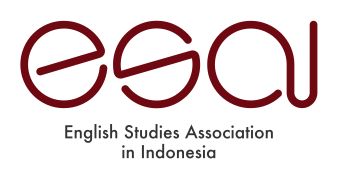Corrective Feedback Recast Uses in Students’ Uptake in Past Form Expressions
Abstract
Research studies have shown that recasts are one of the types of corrective feedback frequently used by teachers in second language teaching. However, little is known about the effectiveness of recasts in second language teaching within Indonesian context since most Interactional Approach studies conducted with Indonesian context focus on corrective feedback in general, not particularly on recasts. Moreover, most of these studies do not include past forms as the language feature being studied. The current study investigated the use of recasts in yielding students’ uptake in past forms (Verb type II). 5 participants were involved in the study. Pairing with the examiner, each participant engaged in a jigsaw-task activity where they received recasts. The recast episodes produced by each participant were analyzed and coded into some categories, which were “repair”, “needs-repair : acknowledgement”, “needs-repair : modified”, “needs-repair : unmodified”, and “no uptake”. The result showed that the uptake which was mostly produced by participants was “needs-repair : acknowledgement”. This finding contradicts the one in the previous study which showed that the uptake that was most frequently produced by the participants was “repair”. The finding of this study is expected to trigger further studies to examine students’ perception towards recasts that leads to the ineffectiveness of it.
Keywords: corrective feedback; recast; past forms; speaking skillsKeywords
Full Text:
PDFReferences
BWC extras. (2012). Ghosts [Image]. Retrieved from https://bwcdigital.files.wordpress.com/2012/03/wl-0082.jpg
Carpenter, H., Jeon, K. S., MacGregor, D., & Mackey, A. (2006). Learners’ interpretations of recasts. Studies in Second Language Acquisition, 28(2), 209–236.
Easy pace learning. (2017). Supermarket and Groceries Vocabulary [Image]. Retrieved from https://www.easypacelearning.com/design/images/Supermarketvocabulary2.jpg
Egi, T. (2010). Uptake, modified output, and learner perceptions of recasts: Learner responses as language awareness. The Modern Language Journal, 94(1), 1–21.
Haryanto, E. (2015). Teachers’ corrective feedback on students’ pronunciation at the daffodils english course kampung inggris pare indonesia. Linguists: Journal of Linguistics and Language Teaching, 2(2).
Ihsan, D. (1989). A linguistic study of tense shifts in Indonesian-English interlanguage autobiographical discourse. Ball State University.
Langit-Dursin, R. (2016). Incidental corrective feedback by classroom teachers and uptake by bilingual elementary students in teacher-learner interactions. Indonesian JELT, 11(1), 47–67.
Leeman, J. (2003). Recasts and second language development: Beyond negative evidence. Studies in Second Language Acquisition, 25(1), 37–63.
Lightbown, P. M., & Spada, N. (2013). How languages are learned 4th edition-Oxford Handbooks for Language Teachers. Oxford university press.
Lyster, R., & Ranta, L. (1997). Corrective feedback and learner uptake: Negotiation of form in communicative classrooms. Studies in Second Language Acquisition, 19(1), 37–66.
Mackey, A., Gass, S., & McDonough, K. (2000). How do learners perceive interactional feedback? Studies in Second Language Acquisition, 22(4), 471–497.
Maolida, E. H. (2013). A descriptive study of teacher’s oral feedback in an ESL young learner classroom in Indonesia. K@ Ta Lama, 15(2), 117–124.
Nicholas, H., Lightbown, P. M., & Spada, N. (2001). Recasts as feedback to language learners. Language Learning, 51(4), 719–758.
Panova, I., & Lyster, R. (2002). Patterns of corrective feedback and uptake in an adult ESL classroom. Tesol Quarterly, 36(4), 573–595.
Rassaei, E. (2014). Scaffolded feedback, recasts, and L2 development: A sociocultural perspective. The Modern Language Journal, 98(1), 417–431.
Solikhah, I. (2016). Oral Corrective Feedback in Speaking Class of English Department. LINGUA: Journal of Language, Literature and Teaching, 13(1), 87–102.
Swain, M., & Lapkin, S. (1998). Interaction and second language learning: Two adolescent French immersion students working together. The Modern Language Journal, 82(3), 320–337.
DOI: http://dx.doi.org/10.30813/jelc.v10i1.1908
Refbacks
- There are currently no refbacks.






